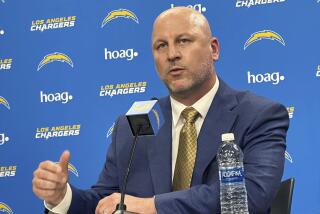Chargers Give Up on Plans
- Share via
The Chargers have dropped plans to put a stadium proposal on the November ballot, casting doubt on whether the NFL franchise will stay in San Diego.
A major stumbling block, the Chargers say, has been finding a development partner, essential to building a privately financed stadium. Team officials say a chaotic political climate in San Diego and the city’s budget crisis have scared away prospective investors.
“Our year-long negotiations with potential development partners have confirmed that this is an enormously complicated project -- a project that is made even more difficult by the city’s unprecedented financial and political crisis,” Mark Fabiani, the team’s special counsel, said in a release.
“And this hard project becomes impossible when key city officials do not want to cooperate. Without the city’s full cooperation, the traffic and infrastructure improvements to be paid for by the private sector could never actually be built, the Environmental Impact Report could never be certified, and hundreds of other important issues could never be resolved.”
The Chargers had proposed a ballot measure asking voter approval to build a $450-million stadium on the 166-acre plot where Qualcomm Stadium sits. The team would pay for the stadium in exchange for development rights to 60 acres adjacent to the venue on which to build 6,000 condominiums, stores and a hotel.
“The Chargers are committed to San Diego,” Fabiani said. “Our goal is to find a publicly acceptable way to build a new, Super Bowl-quality stadium for the San Diego region. We have spent millions of dollars and countless hours over the past three years seeking solutions that work.... We are determined to keep the Chargers right here.”
Under the terms of their renegotiated Qualcomm Stadium lease, the Chargers can talk to other cities beginning Jan. 1, 2007, about possibly relocating. The deal allows the team to leave San Diego at any time after the 2008 season, provided the team pays off the outstanding debt on the stadium. That cost would be $57 million in 2009, slightly less in 2010, and would drop off dramatically after that.



